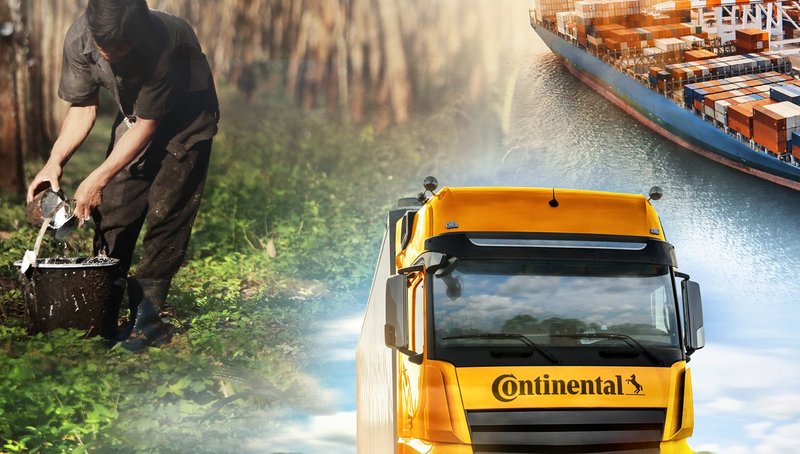Responsible Sourcing of Natural Rubber: Continental Further Expands its Commitment
- Project to enhance sustainability in smallholder natural rubber cultivation with Deutsche Gesellschaft für Internationale Zusammenarbeit (GIZ) GmbH extended
- Since 2018, around 5,000 smallholders have been involved in the project in Indonesia, a further 1,000 are to be added by 2027
- Dr. Michael Radke, Head of Sustainability in Purchasing at Continental: “As one of the largest tire manufacturers in the world, we have a particular responsibility in the natural rubber supply chain. That is why we are committed at all levels and are building capacity locally”
Hanover, Germany, April 15, 2025. Continental has extended its project to enhance sustainability in smallholder natural rubber cultivation with the Deutsche Gesellschaft für Internationale Zusammenarbeit (GIZ) GmbH by three years. Since 2018, around 5,000 local smallholders in West Kalimantan, Borneo, Indonesia, have already been trained to cultivate high-quality natural rubber in line with clearly defined sustainability criteria. By 2027, a further 1,000 smallholders are to be involved in the project, which is co-funded by Continental and the German Federal Ministry for Economic Cooperation and Development (BMZ). The gains are threefold: the smallholders’ income has increased by an average of 27 percent since the start of the project; together with GIZ, Continental is building valuable capacity to improve sustainability in the cultivation of natural rubber by smallholders and to use responsibly sourced natural rubber in products; and precious forests and peatlands are preserved in the project region in Indonesia.
“As one of the largest tire manufacturers in the world, we have a particular responsibility in the natural rubber supply chain. That is why we are committed at all levels and are building capacity locally,” says Dr. Michael Radke, Head of Sustainability in Purchasing at Continental. He adds: “Over the past few years, together with GIZ, we have shown that we can make the natural rubber supply chain transparent and at the same time increase farmers’ incomes. Now we want to reach even more smallholders and create the framework conditions for the successes achieved to be sustained.”
Transparency and sustainability in the supply chain
The project from Continental and GIZ in the district of Kapuas Hulu, which is home to a UNESCO biosphere reserve, addresses two key challenges in natural rubber cultivation: lack of knowledge and insufficient income for farmers. The training provided by Continental and GIZ teaches farmers sustainable cultivation methods and agricultural practices. This improves the quality of the rubber, increases yields, optimizes the supply chain and increases the income of the rubber farmers. Furthermore, this helps to implement the important topic of maintaining or restoring biodiversity in the project area. The introduction of a digital traceability system also ensures transparency throughout the natural rubber supply chain – from the rubber tree to its use in Continental's production. Both companies are not only building capacity locally but are also actively helping to improve the living conditions of smallholders and promote sustainable practices in natural rubber cultivation. Continental has long been actively committed to greater transparency and sustainability in the supply chain, and explicitly supports the goals of the EU Regulation on Deforestation-Free Supply Chains (EUDR).
The responsibly sourced natural rubber produced as part of the project is made available to other manufacturers in addition to Continental's tire plants, and the project is being opened up to additional participants. Projects such as these help to protect human rights, minimize environmental effects and improve the living conditions of local smallholders. The aim is to achieve lasting positive changes, both for the environment and smallholders themselves.
Ambition: all-natural rubber from responsible sources by 2030
By 2050 at the latest, Continental's ambition is to achieve fully sustainable supply chains. For natural rubber, the ambition is to cover the entire demand exclusively through responsible sourcing from 2030 onward. The company’s sustainable natural rubber sourcing policy sets out clear responsibilities and obligations for Continental and all its suppliers and service providers throughout the entire natural rubber value chain. This minimizes environmental, human rights and social risks.
Both Continental and the BMZ are members of the Global Platform for Sustainable Natural Rubber (GPSNR), founded in March 2019, which brings together the most important players in the natural rubber sector from business and civil society, and which was born out of the Tire Industry Project (TIP). Together with other members, they are working to improve sustainability in the natural rubber supply chain on a global scale. The organization has established guidelines for greater sustainability in the natural rubber sector, which Continental and the BMZ have taken into consideration in their project in Indonesia. Interested parties are invited to participate in the project to contribute to the goals of the Global Platform for Sustainable Natural Rubber (GPSNR) together with Continental and the BMZ.

Laura Averbeck
Communications Manager Sustainability
Continental Tires

Henry Schniewind
Head of External Communications
Continental Tires


